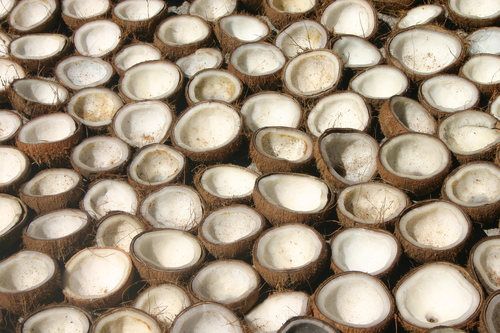Is Coconut Sugar Bad For You?
Also Known As: coco sugar, coconut palm sugar, coco sap sugar
Short answer
Coconut sugar is about as bad for you as normal sugar.
Recommended Alternative
Harmful to your health. A few benefits may be associated, but the bad outweighs the good. Moderation is extremely important.
View Full Grading System
Category 'A'
Very healthy and numerous health benefits. Side effects are rare. Things rated an 'A+' are typically necessary for survival (for example, water).
Very healthy and numerous health benefits. A few harmful qualities may be associated, but only under certain circumstances such as an allergic reaction.
Very healthy and numerous health benefits. Harmful qualities may be associated, but aren't usually serious.
It is important to note that even the best things in life can become bad in immoderate amounts. So, although something may be rated an 'A+', overconsumption/overdoing can bring unwanted effects.
Category 'B'
Very beneficial to your health. Things rated a 'B+' may have a few harmful qualities to pay attention to.
Overall beneficial to your health. Things rated a 'B' may have some harmful qualities to pay attention to.
More beneficial to your health than not. However, harmful qualities are most likely associated and shouldn't be overlooked.
The main difference between category 'A' and category 'B' is the harmful qualities typically present in 'B' items. Serious side effects are usually uncommon, but are still possible and should be taken note of.
Category 'C'
Both beneficial and harmful qualities associated. Things rated a 'C+' are typically a bit more on the beneficial side. Still, moderation is important.
A fairly even ratio of beneficial and harmful qualities. Moderation is important. Very general topics that can lean towards both sides of the spectrum will be placed here as well. Rice, for example, can be good or bad depending on the type.
More harmful than beneficial. Side effects are common, especially when consumed/done excessively. Moderation is very important.
Category 'C' usually denotes to both good and bad qualities. When it comes to this category, it is important to keep this word in mind: moderation.
Category 'D'
Harmful to your health. Although benefits may be associated, the bad most likely outweighs the good. Moderation is very important.
Harmful to your health. A few benefits may be associated, but the bad outweighs the good. Moderation is extremely important.
Harmful to your health. Very few, if any, benefits are present. Things in this category should be avoided as much as possible.
Category 'D' is typically for things that are more harmful than beneficial. While consuming/doing something unhealthy once in a blue moon shouldn't hurt, we definitely recommend eliminating 'D' items as a regular part of your routine/diet.
Category 'F'
Category 'F' is for things that fail to bring anything beneficial to the table, and are very harmful to your health. We recommend completely avoiding anything in this category. Long-term side effects of 'F' items are usually very serious.
Category 'N'
'N' stands for neutral. Things placed into this category are generally (a) neither good nor bad for you, or (b) lack the necessary evidence to reach any conclusions.
Long answer
Coconut sugar is derived from the flowers of the coconut palm. It's marketed as a sweetener that's better than traditional choices like honey or table sugar. Producers claim that coconut sugar has a relatively low glycemic index: that's the rate at which the body's blood sugar rises when you eat something. The lower the glycemic index, the less your blood sugar will spike, meaning that coconut sugar (theoretically) is easier on your weight and better for those suffering from diabetes.
Is it true, though? The evidence is pretty thin. Glycemic index isn't tested by the FDA, so manufacturers are free to make claims without regulatory vetting. Glycemic index measurements are also inexact because our bodies process glucose at different rates depending on our individual metabolic profiles. It can also change based on how food is prepared and what it's eaten with.
The Chicago Tribune reported back in 2012 that coconut sugar has a GI of around 35 - for reference, honey hits around 55 and table sugar around 68. The University of Sydney disagrees, however. They maintain an authoritative index of GI values and peg coconut sugar at 54 - right where honey is. According to that number, coconut sugar is no better than honey; it'll still spike your blood sugar, which will lead to a crash and be stored as fat.
The American Diabetes Association agrees: there's no evidence that coconut sugar has an extraordinarily low glycemic index, they say, and it should be treated like normal table sugar if you have diabetes or are at risk of developing it. It has the same number of carbohydrates per teaspoon as table sugar, so you won't be cutting any calories out of your diet by substituting coconut sugar for table sugar.
Coconut sugar has also sparked protests from the coconut oil industry over whether or not it's sustainable. Coconut oil advocacy and sales site Tropical Traditions has a well-argued takedown of coconut sugar: they argue that's it's damaging the market for other coconut-based products and that the coconut industry won't easily be able to pivot back around after the coconut sugar craze is over.
Coconut palm production is also land-intensive: depending on where your coconut sugar is sourced from, the plantations that make coconut sugar may be putting pressure on subsistence farmers already struggling to feed their families.
Possible short-term side effects
- blood sugar spikes
-
promotes overeating
Possible long-term side effects
- type 2 diabetes
-
heart disease
-
obesity
Benefits
- may have a slightly lower glycemic index than table sugar
Our Wellness Pick
(what is this?)
Anthony's Organic Coconut Sugar
- Organic sweetener
- Bulk 5-pound bag
- Gluten-free
- Non-GMO
- Low glycemic index
Learn More!
Please turn your Ad Blocker off to see this content. Thank you!

 Approved by
Approved by 















